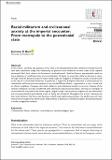Files in this item
Racial militarism and civilizational anxiety at the imperial encounter : from metropole to the postcolonial state
Item metadata
| dc.contributor.author | Gani, Jasmine K. | |
| dc.date.accessioned | 2021-11-12T13:30:07Z | |
| dc.date.available | 2021-11-12T13:30:07Z | |
| dc.date.issued | 2021-11-11 | |
| dc.identifier | 276087816 | |
| dc.identifier | eaa8e765-0281-43c7-9a0f-7134323338d9 | |
| dc.identifier | 85118978173 | |
| dc.identifier | 000718349500001 | |
| dc.identifier.citation | Gani , J K 2021 , ' Racial militarism and civilizational anxiety at the imperial encounter : from metropole to the postcolonial state ' , Security Dialogue , vol. Online First . https://doi.org/10.1177/09670106211054901 | en |
| dc.identifier.issn | 0967-0106 | |
| dc.identifier.other | ORCID: /0000-0002-8218-1807/work/103138043 | |
| dc.identifier.uri | https://hdl.handle.net/10023/24329 | |
| dc.description.abstract | In this article, I ask three key questions: First, what is the relationship between militarism and race? Second, how does colonialism shape that relationship to produce racial militarism on both sides of the imperial encounter? And, third, what is the function of racial militarism? I build on Fanon’s psychoanalytic work on the production of racial hierarchies and internalization of stigma to argue that militarism became a means through which the European imperial nation-state sought to mitigate its civilizational anxiety and assert itself at the top of a constructed hierarchy. In particular, I argue that European militarism is constituted by its colonization and historical constructions of the so-called Muslim Orient, stigmatized as a rival, a threat and an inferior neighbour. However, this racial militarism and civilizational anxiety is not only a feature of the colonial metropole, but also transferred onto colonized and postcolonial states. Drawing on examples of racial militarism practised by the Syrian regime, I argue Europe’s racial-militarist stigmas are also internalized and instrumentalized by postcolonial states via fleeing and transferral. Throughout the article, I demonstrate that racial militarism has three main functions in both metropole and postcolony: the performance of racial chauvinism and superiority; demarcation of boundaries of exclusion; and dehumanization of racialized dissent in order to legitimate violence. | |
| dc.format.extent | 21 | |
| dc.format.extent | 160285 | |
| dc.language.iso | eng | |
| dc.relation.ispartof | Security Dialogue | en |
| dc.subject | Militarism | en |
| dc.subject | Racial militarism | en |
| dc.subject | Racialised religion | en |
| dc.subject | Fanon | en |
| dc.subject | Civilization | en |
| dc.subject | Syria | en |
| dc.subject | JZ International relations | en |
| dc.subject | T-NDAS | en |
| dc.subject | SDG 16 - Peace, Justice and Strong Institutions | en |
| dc.subject.lcc | JZ | en |
| dc.title | Racial militarism and civilizational anxiety at the imperial encounter : from metropole to the postcolonial state | en |
| dc.type | Journal article | en |
| dc.contributor.institution | University of St Andrews. School of International Relations | en |
| dc.identifier.doi | 10.1177/09670106211054901 | |
| dc.description.status | Peer reviewed | en |
| dc.date.embargoedUntil | 2021-11-11 |
This item appears in the following Collection(s)
Items in the St Andrews Research Repository are protected by copyright, with all rights reserved, unless otherwise indicated.

